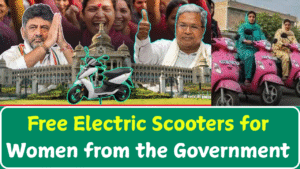Free Electric Scooters for Women from the Government
Introduction
The Indian government, alongside multiple state governments, has launched initiatives to provide free or subsidized electric scooters to women. These schemes promote mobility, education, employment, and eco-friendly transportation for women, especially in rural and low-income areas.

Objectives of the Scheme
- Women Empowerment: Promote independence and confidence among women.
- Encourage Education: Help girls attend schools and colleges regularly.
- Support Employment: Enable women to work in gig economy, delivery jobs, and small businesses.
- Green Mobility: Reduce carbon footprint and promote the use of electric vehicles.
- Cost Reduction: Save on public transport fares and travel time.
Central Government Role
While the Central Government doesn’t directly offer free e-scooters, it supports electric mobility via the FAME (Faster Adoption and Manufacturing of Hybrid & Electric Vehicles) scheme. This indirectly helps reduce the cost of electric scooters provided under state schemes.
Major State-Wise Free Electric Scooter Schemes
🔹 Tamil Nadu – Pudhumai Pen + EV Support
- For college girls from government schools.
- Offers free electric scooters and financial aid.
- Promotes girl education and women’s mobility.
🔹 Karnataka – Shakti Yojane + EV Subsidy
- Offers up to ₹40,000 subsidy on electric scooters.
- Targets women with labor cards, students, and workers.
- Complements the free bus ride scheme.
🔹 Andhra Pradesh – Vahini Scheme
- Scooters for self-help group women and tribal women.
- Linked with YSR Cheyutha and Sunna Vaddi welfare programs.
🔹 Telangana – Free E-Scooter Scheme
- Focused on Anganwadi, ASHA workers, and low-income self-employed women.
- Partnerships with local EV manufacturers.
🔹 Gujarat – Women Empowerment Mobility
- Offers free e-scooters/bicycles to school and college-going girls.
- Promotes education and green mobility.
🔹 Delhi – EV Subsidy for Women
- Provides up to ₹45,000 subsidy.
- Includes features like GPS, safety alarms, insurance.
- Special support for female delivery partners.
Eligibility Criteria (General Across States)
- Must be a woman aged 18–45 years (may vary by state).
- Resident of the respective state.
- Belong to a low-income family (income typically < ₹2–3 lakh per year).
- Preference to:
- College students
- SHG members
- Anganwadi/ASHA workers
- Labor card holders
- Widows/single women
Required Documents
- Aadhaar Card
- Residence Certificate
- Income Certificate
- College/School ID
- Labor Card (if applicable)
- Passport Photos
- Bank Details
- Mobile Number
Application Process
🔸 Online
- Visit state scheme portal (e.g., Seva Sindhu, Pudhumai Penn, MeeSeva).
- Register, upload documents, and apply.
🔸 Offline
- Visit Taluk or Women Welfare Office.
- Fill form and submit physical documents.
Benefits of the Scheme
- Free mobility and zero travel cost
- Time savings
- Increased workforce participation
- Support for education
- Boosts entrepreneurship in women
- Contributes to the environment by using non-polluting vehicles
Electric Scooter Features
- Range: 60–100 km per charge
- Speed: Up to 45 km/h
- Includes: Helmet, insurance, GPS tracking, smart lock
- Warranty: 2–3 years for service and battery
Support for Employment
These scooters are ideal for:
- Delivery agents (Zomato, Swiggy)
- Beauticians, tailors, and home tutors
- Anganwadi and health workers
- Self-employed SHG women
Support for Education
- Assists students in attending:
- College
- Coaching classes
- Examinations and interviews
- Reduces dropout rates and increases girl-child education
Green Mission Impact
- Promotes electric vehicle (EV) adoption
- Reduces CO₂ emissions
- Helps India meet climate targets
- Aligns with FAME-II and National Electric Mobility Mission
Funding and Budget
- State governments allocate ₹100–₹500 crore per scheme.
- Involves CSR partnerships, bulk purchases, and EV manufacturer collaborations.
- Government collaborates with:
- TVS
- Hero Electric
- Ola Electric
- Ather Energy
Challenges in Implementation
- Lack of public awareness
- Inadequate charging infrastructure
- Rural maintenance issues
- Possibility of scams and fake application portals
- Logistical delays in scooter distribution
Success Stories
- Radha (Karnataka): Became a home-based tailor earning ₹20,000/month.
- Anjali (Tamil Nadu): Travels 20 km daily to attend college.
- Munni (AP): Top-performing female delivery agent in her district.
Digital Tools and Application Portals
- Seva Sindhu (Karnataka)
- Pudhumai Penn Portal (Tamil Nadu)
- MeeSeva (Telangana)
- e-District (Delhi, UP, etc.)
- Services include:
- Application
- Tracking
- Grievance redressal
- Certificate download
Urban vs. Rural Impact
Urban
- Women join gig work
- Safe night-time travel
Rural
- Enables access to:
- Health centers
- Schools and colleges
- Self-help group meetings
- Markets
How to Track Application
- Visit state portal
- Enter Aadhaar or Application ID
- Check real-time status (approved/rejected/pending)
FAQs
Q1. Is it totally free?
Yes, in many states. Others offer high subsidies (₹25,000–₹45,000).
Q2. Is it for all women?
Only eligible low-income women, often with priority to students and workers.
Q3. How long will delivery take?
Varies by state—usually 1–3 months after approval.
Q4. Can married women apply?
Yes, if income and other criteria are met.
Q5. Can I choose the scooter model?
Usually, selected models are predefined by the government through tender.
Conclusion
The Free Electric Scooter Scheme for Women is a powerful step towards economic freedom, gender equity, and clean energy goals. By offering mobility, the government enables women to pursue education, work, and entrepreneurship. It’s a flagship policy that combines social welfare, digital empowerment, and climate responsibility—truly making mobility a right, not a privilege.
